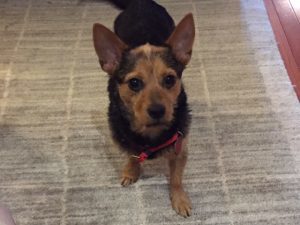Losing Toby
Toby was my fourth dog. He was my COVID dog, my first shelter dog, first mutt. He was a ridiculously picky eater. He was my most photogenic dog.

Toby had Milk Dud eyes, perky ears and a perfectly proportioned snoot (long but nothing like a snout). Once, he even stopped traffic — a big guy driving a construction rig stopped in the middle of the street to tell me that Toby was what a
dog should look like: a 15-pound German shepherd.
Toby didn’t much care for other dogs, which might have been the result of his first three years, before we adopted him. Or it could have just been his terrier-ness.
He did like people and while he wasn’t a kissy dog, if a human went face-to-face with him, he would lick till he was stopped. Toddlers were a favorite.
He was terrified of the shiny black marble in front of our fireplace. Whenever he came came home — from a weekend away or a walk around the block — he approached the inky slab with great caution and then backed away. I imagine it looked to him like a gaping doorway to oblivion.
Last month, Toby died an untimely death. My other dogs (Bartholomew the beagle, Pom the poodle, Buddy the schnauzer) all lived into their second decade. Their deaths were expected, which didn’t make them easy, but Toby was just 9 years old, and part of my household for only six. He was diagnosed with lymphoma on Dec. 24 and died Jan. 12.
My Facebook post about Toby’s death elicited a tsunami of sweet messages and heart emojis. People who knew him said kind things about him, and those who didn’t recalled the lives of their own dearly departed pooches.
Many sent wishes that my memories of Toby would be a consolation or a blessing. But I don’t think it works that way with dogs — at least not for me. Dogs inhabit the here and now. They don’t think about last night’s supper or the treat they’ll get after the morning stroll. They follow their noses. They are alert to the presence of other dogs or — oh joy! — a rabbit.
They show us what it means to be fully present. Walking doglessly, my mind wanders to the day’s to-do list, which can send me into a spiral of worry about what I forgot yesterday, which might doom my ability to go to a my yoga class tomorrow.
Walking with Toby, I noticed birdsong, and the shape of trees in season — from skeletal in winter to the green blush of spring growth, to summer lushness, to the autumn riot.
I took deeper breaths. I greeted and was greeted by other dogwalkers. Strangers smiled at Toby, which made me smile — happy to be at the other end of his leash. Happy to be alive.
Mary Oliver, the psalmist of our times, wrote about the ways that the natural world keeps us awake to wonder and awe. Oliver, also the poet laureate of canines, published a book entitled “Dog Songs.” She wrote:
“Because of the dog’s joyfulness, our own is increased. It is no small gift. It is not the least reason why we should honor as well as love the dog of our own life, and the dog down the street, and all the dogs not yet born. What would the world be like without music or rivers or the green and tender grass? What would this world be like without dogs?”
When I tell people that I’ve been crying, on and off since Toby died, some who have suffered this particular loss, say, “That’s why I’ll never get another dog.”
I’m not ready yet, but I don’t like being dogless. I miss the ego gratification of returning home after a weekend — or a few hours — to an ecstatic welcome. I miss urgent invitations to play tug, or toss a ball, or just give myself over to the attention of a wet nose and shining eyes.
Toby insisted that I get out of the house. He didn’t move from my side when I was sick in bed. He warded off depression. He was my social connector. And as soon as I feel ready to love a dog who is not Toby, I will go out and find him or her.
It won’t take long.
Published in WBUR’s Cognoscenti